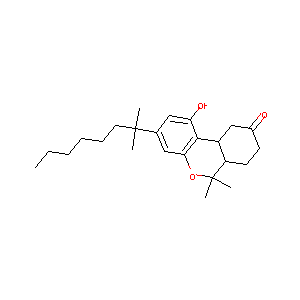| 1 |
Recurrent recessive mutation in deoxyguanosine kinase causes idiopathic noncirrhotic portal hypertension.Hepatology. 2016 Jun;63(6):1977-86. doi: 10.1002/hep.28499. Epub 2016 Mar 31.
|
| 2 |
Drugs@FDA. U.S. Food and Drug Administration. U.S. Department of Health & Human Services. 2015
|
| 3 |
Trifluoperazine FDA Label
|
| 4 |
Novel 1',1'-chain substituted hexahydrocannabinols: 9-hydroxy-3-(1-hexyl-cyclobut-1-yl)-hexahydrocannabinol (AM2389) a highly potent cannabinoid r... J Med Chem. 2010 Oct 14;53(19):6996-7010.
|
| 5 |
Cloning and pharmacological characterization of the dog cannabinoid CB?receptor. Eur J Pharmacol. 2011 Nov 1;669(1-3):24-31. doi: 10.1016/j.ejphar.2011.08.002. Epub 2011 Aug 19.
|
| 6 |
Assessment of the inhibition potential of Licochalcone A against human UDP-glucuronosyltransferases. Food Chem Toxicol. 2016 Apr;90:112-22.
|
| 7 |
Inhibitory effect of jujuboside A on glutamate-mediated excitatory signal pathway in hippocampus. Planta Med. 2003 Aug;69(8):692-5.
|
| 8 |
Mammalian drug efflux transporters of the ATP binding cassette (ABC) family in multidrug resistance: A review of the past decade. Cancer Lett. 2016 Jan 1;370(1):153-64.
|
| 9 |
Psychotropic Medications Metabolized by Cytochromes P450 (CYP) 1A2 Enzyme and Relevant Drug Interactions: Review of Articles
|
| 10 |
Human FMO2-based microbial whole-cell catalysts for drug metabolite synthesis. Microb Cell Fact. 2015 Jun 12;14:82.
|
| 11 |
Characterization of the ATPase activity of the Mr 170,000 to 180,000 membrane glycoprotein (P-glycoprotein) associated with multidrug resistance in K562/ADM cells. Cancer Res. 1988 Sep 1;48(17):4926-32.
|
| 12 |
Rescue of Pink1 Deficiency by Stress-Dependent Activation of Autophagy. Cell Chem Biol. 2017 Apr 20;24(4):471-480.e4. doi: 10.1016/j.chembiol.2017.03.005. Epub 2017 Mar 30.
|
| 13 |
Association of high prolactin levels and neuroleptics immediately postpartum. J Neuropsychiatry Clin Neurosci. 1990 Winter;2(1):115. doi: 10.1176/jnp.2.1.115b.
|
| 14 |
Molecular mechanism of trifluoperazine induces apoptosis in human A549 lung adenocarcinoma cell lines. Mol Med Rep. 2009 Sep-Oct;2(5):811-7. doi: 10.3892/mmr_00000177.
|
| 15 |
Stonin 2 activates lysosomal-mTOR axis for cell survival in oral cancer. Toxicol In Vitro. 2023 Apr;88:105561. doi: 10.1016/j.tiv.2023.105561. Epub 2023 Jan 23.
|
| 16 |
Role of TRP channels and NCX in mediating hypoxia-induced [Ca(2+)](i) elevation in PC12 cells. Respir Physiol Neurobiol. 2008 Dec 31;164(3):386-93. doi: 10.1016/j.resp.2008.09.002. Epub 2008 Sep 7.
|
| 17 |
ADReCS-Target: target profiles for aiding drug safety research and application. Nucleic Acids Res. 2018 Jan 4;46(D1):D911-D917. doi: 10.1093/nar/gkx899.
|
|
|
|
|
|
|


